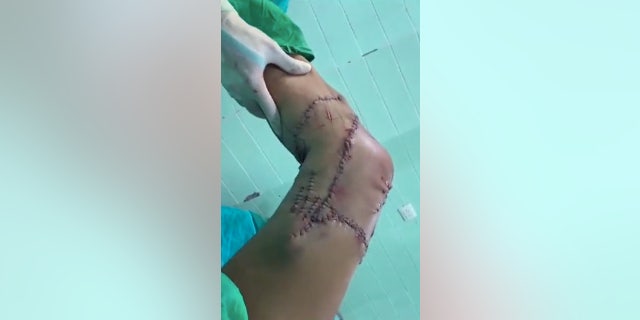An American tourist survived a shark attack while swimming around the Galapagos Islands last week, but she never saw the shark that bit her or saw the attack when it happened.
“It felt like a blow so I didn’t realize what it was,” Delia Yriarte, a 42-year-old nurse told local media. “While I was swimming I felt my leg go numb. When I turned around, I saw there was a lot of blood.”
Footage of the aftermath of the shark attack showed people lifting Yriarte off a dinghy with her leg wrapped to stop the bleeding.
“By the time we got to the beach, I was already feeling drained,” she explained. “I knew what type of wound it was, I saw it was deep, and I knew I was losing a lot of blood.”
SHARK EXPERT DR. GAVIN NAYLOR HAS ADVICE FOR SAFELY AVOIDING ATTACKS
She went immediately to the Hospital Republica del Ecuador on Santa Cruz Island, where doctors worked to save her life.
Delia Yriarte, a 42-year-old nurse, suffered serious injuries to her right leg when a shark bit her while she was snorkeling near the Galapagos Islands. (Jam Press)
The Ecuadorian navy later said Yriarte, an American national originally from Mexico, had been transferred to San Cristobal Island before leaving on a military plane to the city of Guayaquil on the mainland, NBC Bay Area reported.
RIPTIDES, DROWNING RISKS ‘A LOT MORE DANGEROUS’ THAN SHARKS: DR. MIKE HEITHAUS
She suffered five tendon tears and required 100 sutures to her leg, with some loss of tissue that will require grafts and “probably a few more surgeries,” she explained.

Ecuadorian navy personnel helped transport Delia Yriarte from the dinghy to a car to transport her to the nearest hospital. (Jam Press)
“I felt a little bit of a touch, not a pull not nothing like that and after that I felt my leg a little numb, then I kept pedaling, and I felt that my leg wasn’t responding,” she said.
NY ADDS SHARK-SCANNING DRONES TO BEACHES AFTER 5 ATTACKS IN 2 DAYS
“I’m assuming that because it was so fast my brain didn’t have time to register the pain.”
WARNING: GRAPHIC CONTENT

A video grab of Delia Yriarte’s injured right leg in stitches. (Jam Press)
Yriarte is a single mother with a 15-year-old daughter in San Jose, California. Family and friends started a GoFundMe page to help pay for her medical and travel expenses following the attack.
She has coordinated with the U.S. consulate regarding her return home. She has to continue therapy to regain the full use of her leg, but doctors remain optimistic she will be able to walk again, even though it may take months to reach that point.
CLICK HERE TO GET THE FOX NEWS APP
“I understand it’s going to be a long process, but I’m just lucky that I’m still alive,” said Yriarte.
The Galapagos Islands, famous for Charles Darwin’s research that helped him formulate his theory of evolution by natural selection, sit some 600 miles from the Ecuadorian coast.